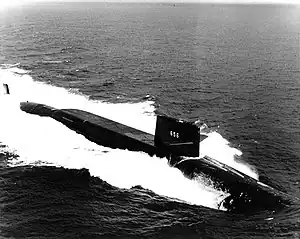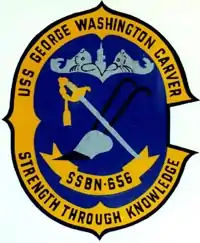 USS George Washington Carver (SSBN-656) ca. June 1966 | |
| History | |
|---|---|
| Name | USS George Washington Carver |
| Namesake | George Washington Carver (1865–1943), an American researcher and inventor |
| Awarded | 29 July 1963 |
| Builder | Newport News Shipbuilding and Dry Dock Company, Newport News, Virginia |
| Laid down | 24 August 1964 |
| Launched | 14 August 1965 |
| Sponsored by | Miss Marian Anderson (1897-1993) |
| Commissioned | 15 June 1966 |
| Decommissioned | 18 March 1993 |
| Stricken | 18 March 1993 |
| Motto | Strength Through Knowledge |
| Fate | Scrapping via Ship and Submarine Recycling Program completed 21 March 1994 |
| General characteristics | |
| Class and type | Benjamin Franklin class fleet ballistic missile submarine |
| Displacement |
|
| Length | 425 ft (130 m) |
| Beam | 33 ft (10 m) |
| Draft | 33 ft (10 m) |
| Installed power | 15,000 shp (11,185 kW) |
| Propulsion | One S5W pressurized-water nuclear reactor, two geared steam turbines, one shaft |
| Speed | Over 20 knots |
| Test depth | 1,300 feet (400 m) |
| Complement | Two crews (Blue Crew and Gold Crew) of 100 officers and enlisted men each |
| Armament |
|
USS George Washington Carver (SSBN-656), a Benjamin Franklin class fleet ballistic missile submarine, was the second ship of the United States Navy to be named for George Washington Carver (1865–1943), an American researcher and inventor.
Construction and commissioning
The contract for George Washington Carver's construction was awarded on 29 July 1963, and her keel was laid down on 24 August 1964 by the Newport News Shipbuilding and Dry Dock Company at Newport News, Virginia. She was launched on 14 August 1965, sponsored by African-American contralto Marian Anderson (1897–1993), and commissioned on 15 June 1966 with Captain R. D. Donavan in command of the Blue Crew and Lieutenant Commander Carl J. Lidel in command of the Gold Crew.
Service history
Following shakedown, George Washington Carver's began her first strategic deterrent patrol on 12 December 1966. She operated out of Holy Loch, Scotland until September, 1971, when she transferred to Groton, Conn. for two months of special operations before entering the shipyard at Electric Boat Div., Groton, Conn. in November, 1971, for reactor refueling and overhaul. George Washington Carver was in dry dock at Naval Station Rota, Spain for overhaul beginning February 1977. A team from Electric Boat Div. Groton, CT was deployed to complete the overhaul/refit.
- History needed for 1966-1991.
Conversion of missile tubes
In 1991, George Washington Carver's ballistic missile had missiles removed and tubes were filled with ballast at Naval Weapons Station, Charleston, SC. The submarine and crew then received a change of homeport to Naval Submarine Base, Bangor, WA and assisted on the west coast in various assignments before finally entering the Puget Sound Naval Shipyard at Bremerton, Washington.
- History needed for 1991-1993.
Decommissioning and disposal
George Washington Carver was both decommissioned and stricken from the Naval Vessel Register on 18 March 1993 at the Puget Sound Naval Shipyard in Bremerton, Washington, where her scrapping via the U.S. Navy's Ship and Submarine Recycling Program was completed on 12 March 1994.

References
- This article incorporates text from the public domain Dictionary of American Naval Fighting Ships. The entry can be found here.
- This article includes information collected from the Naval Vessel Register, which, as a U.S. government publication, is in the public domain. The entry can be found here.
- Photo gallery of USS George Washington Carver at NavSource Naval History